Key takeaways:
- Healthy eating involves choosing a variety of whole foods, listening to hunger cues, and practicing mindful choices.
- Meal preparation reduces stress, saves time and money, and enhances connection to food, leading to healthier eating habits.
- Incorporating variety, planning ahead, and using effective tools like clear containers and a kitchen scale are essential for successful meal prepping.
- Creative meal prep ideas, such as mason jar salads and one-pan dishes, can make healthy eating enjoyable and convenient.
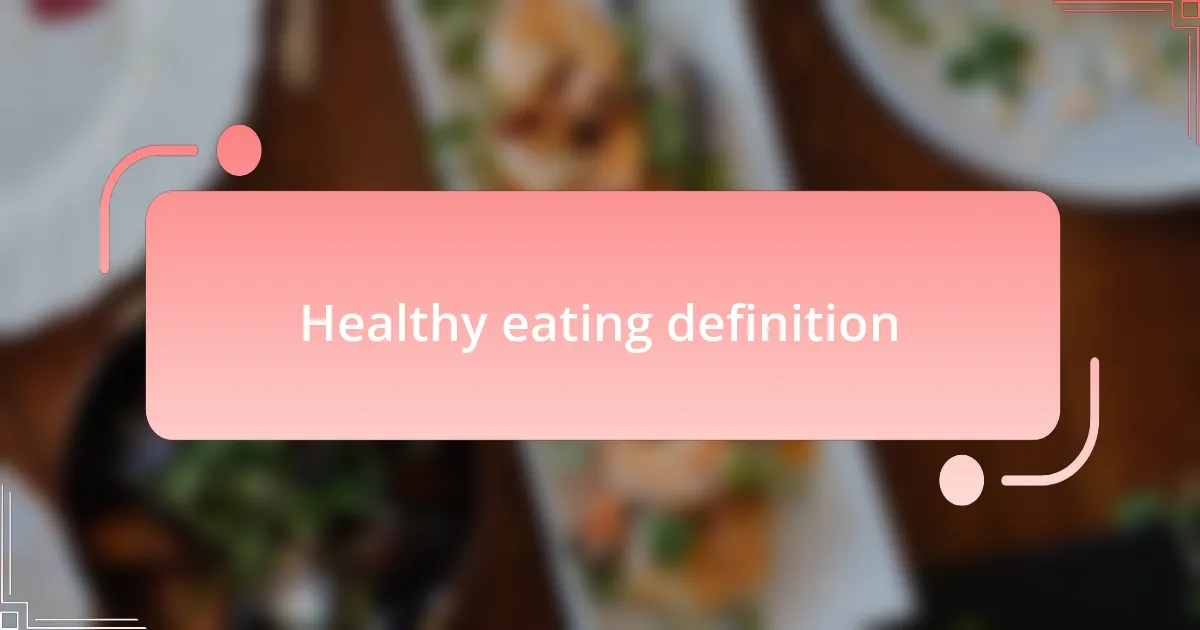
Healthy eating definition
Healthy eating, in my view, means choosing wholesome foods that nourish both the body and mind. It’s not just about avoiding junk food; it’s about embracing a balanced diet filled with fruits, vegetables, whole grains, and lean proteins. I remember the first time I swapped refined grains for whole grains. The difference in my energy levels was remarkable!
When I think about the essence of healthy eating, I hear my grandmother’s voice reminding me to eat the colors of the rainbow. Each color represents different nutrients that our bodies need. How often do we overlook this simple yet profound wisdom? Incorporating a variety of nutrients has truly transformed my meals into celebrations of flavor and health.
Healthy eating also encompasses mindful choices; it’s about listening to your body’s hunger cues rather than just eating out of habit. I recall a time when I would grab a snack while working late, only to realize later that I wasn’t actually hungry. Do you experience something similar? By paying attention to what my body really needs, I’ve fostered a much more harmonious relationship with food.

Importance of meal preparation
Meal preparation plays a pivotal role in maintaining a healthy lifestyle. When I set aside a few hours each week to prep my meals, I find that it alleviates the stress of daily cooking and helps me resist the temptation of reaching for unhealthy options. Have you ever found yourself in a rush, settling for takeout simply because you didn’t have a meal ready? I certainly have, and it often left me feeling sluggish and unsatisfied.
Not only does meal prep save time, but it also ensures that I have balanced, nutritious options readily available. I recall a particularly busy week when I prepped a batch of quinoa salads packed with veggies and lean protein. Each bite was a reminder that I was choosing health amid chaos. That week, I felt more energized and focused, which reinforced the value of planning ahead.
Moreover, preparing meals in advance fosters a deeper connection with food. When I chop vegetables and mix ingredients, it becomes a mindful practice rather than a mundane chore. I often ask myself, “What can I incorporate this week to keep meals exciting?” This process transforms eating from a simple necessity into an opportunity for creativity and self-care. Isn’t it amazing how a little organization can lead to so many positive changes?
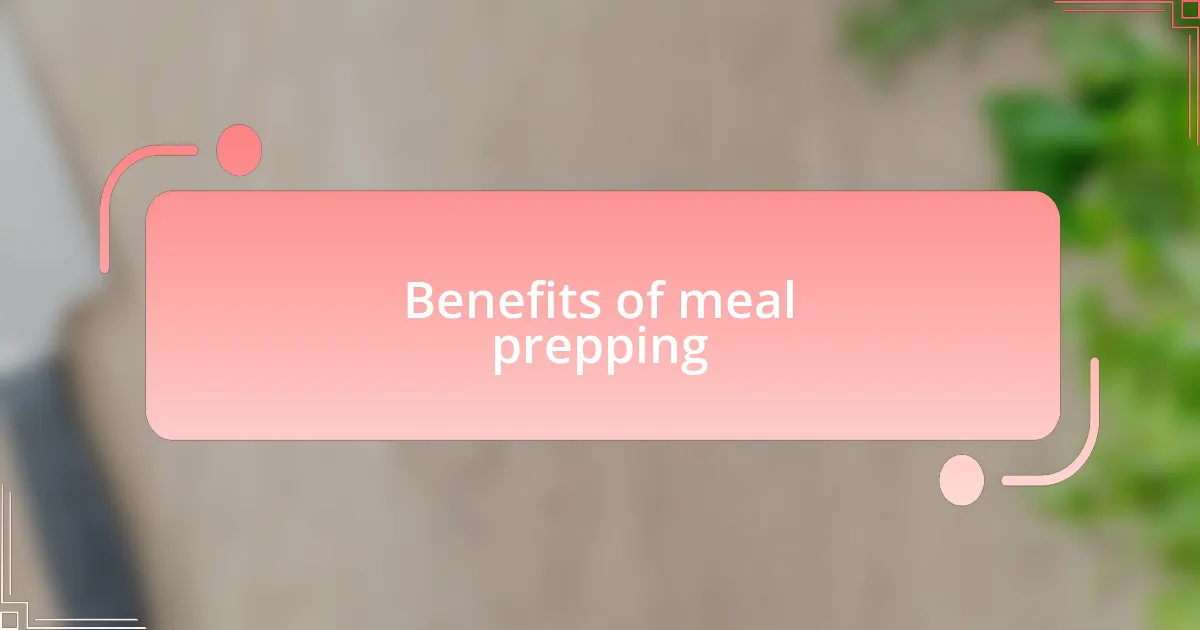
Benefits of meal prepping
Meal prepping provides a significant advantage in terms of time management. I remember a time when I had a week filled with meetings and deadlines, and I devoted a Sunday afternoon to prepare my meals. By doing so, I freed up my evenings, allowing me to spend quality time with loved ones instead of scrambling in the kitchen. Doesn’t it feel great to reclaim that time?
Another noteworthy benefit is the financial savings that meal prepping can bring. I often find that by purchasing ingredients in bulk and using them across multiple meals, my grocery bill drops significantly. For example, I once bought a large bag of brown rice, which lasted me weeks. It not only cut costs but also reduced food waste, as I made a point to use every ingredient creatively. Have you ever tracked how much you save when you stop relying on convenience foods? The numbers can be eye-opening.
There’s also an undeniable psychological boost that comes from having healthy meals ready to go. On days when I’m tempted to snack or skip a proper meal, seeing my neatly packed containers inspires me to make better choices. I can’t help but feel a sense of accomplishment when I open my fridge and see my colorful, nutritious options lined up. How uplifting is it to know that I’m prioritizing my health, one meal at a time?
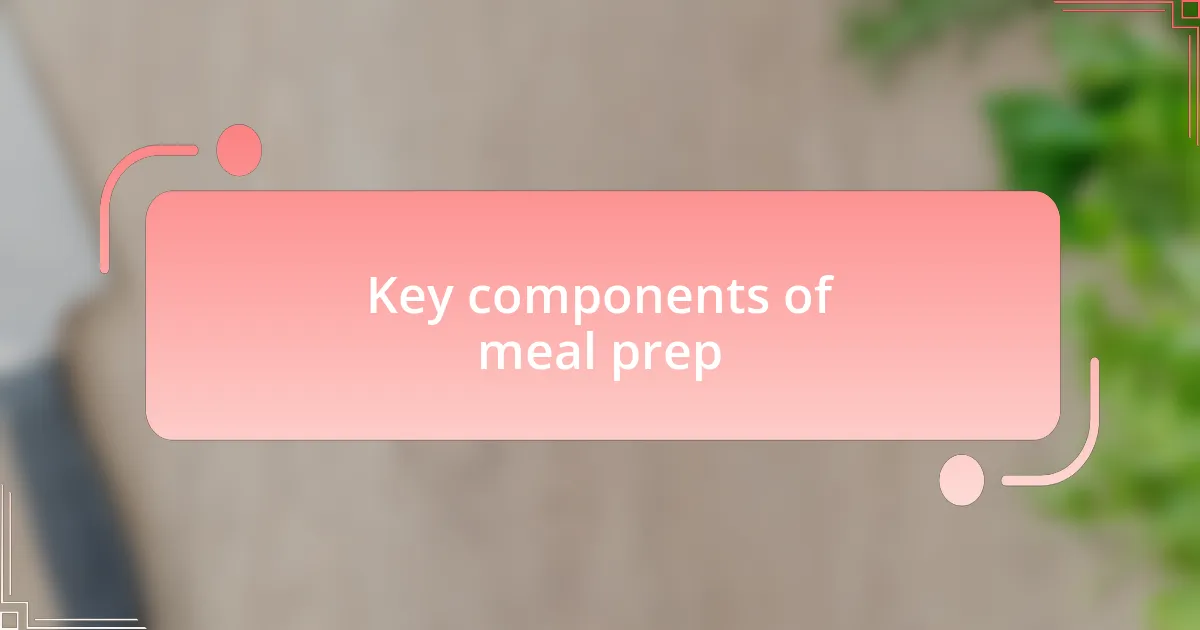
Key components of meal prep
When it comes to meal prep, choosing the right components can truly make a difference. Personally, I focus on incorporating a variety of whole foods, such as grains, lean proteins, and colorful vegetables. I recall a time when I made a big batch of quinoa, grilled chicken, and a medley of roasted veggies. It was a game changer. By diversifying my ingredients, I kept my meals exciting and ensured that I was getting a broad range of nutrients.
Another essential element of my meal prep is portion control. I like to use containers that clearly divide different food groups, which not only helps me manage my serving sizes but also encourages balanced meals. There was a week when I overfilled my containers, thinking I’d be hungrier than usual. However, I ended up feeling sluggish and regretted not adhering to better portion sizing. Have you ever noticed how easy it is to overeat, especially when you’re distracted? Finding the right balance is crucial for feeling energized.
Lastly, I believe that planning for snacks is just as important as preparing main meals. I often cut up fruits or prep nut mixes to keep myself satisfied between meals. One evening, I found myself reaching for a sugary treat, but then I spotted my prepped apple slices with almond butter instead. That moment reminded me how crucial it is to have healthy options on hand. Have you considered how your snack choices can impact your overall wellness?
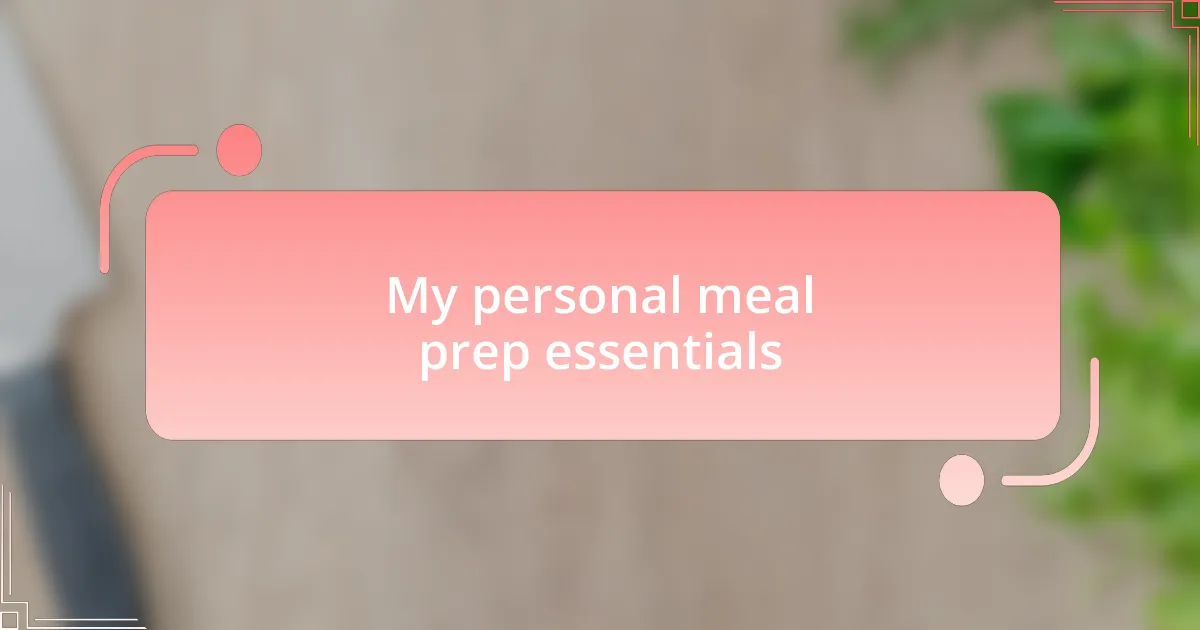
My personal meal prep essentials
When it comes to my meal prep essentials, storage containers play a pivotal role in keeping everything organized. I prefer clear, stackable containers because they allow me to see what I have at a glance. I remember a time when I used opaque containers, and I often forgot what meals I had prepped, leading to wasted food. Have you ever had that frustrating moment of digging through your fridge only to find old leftovers that you forgot were there?
One tool that has truly changed my meal prep game is a good digital kitchen scale. This tiny device aids in precision, especially with ingredients like grains or protein, ensuring that I’m hitting my nutritional goals without overestimating portions. I can still recall the sense of accomplishment I felt when I weighed out the exact amount of nuts for my salads, knowing I was making healthier choices. Have you ever noticed how easy it is to underestimate just how much we’re eating? That extra handful can really add up!
In addition to tools and containers, I can’t stress enough the importance of a weekly planning session. I set aside time each Sunday to jot down my meals for the week, which not only keeps me focused but also sparks creativity. I often find myself tapping into seasonal ingredients that excite my palate. There was a surprising joy I felt when I discovered a new recipe using butternut squash and kale—ingredients I wouldn’t have thought to pair before. Do you take time to plan your meals, or do you find yourself deciding on the spot? Knowing what I’m having in advance saves me significant mental energy during the week.
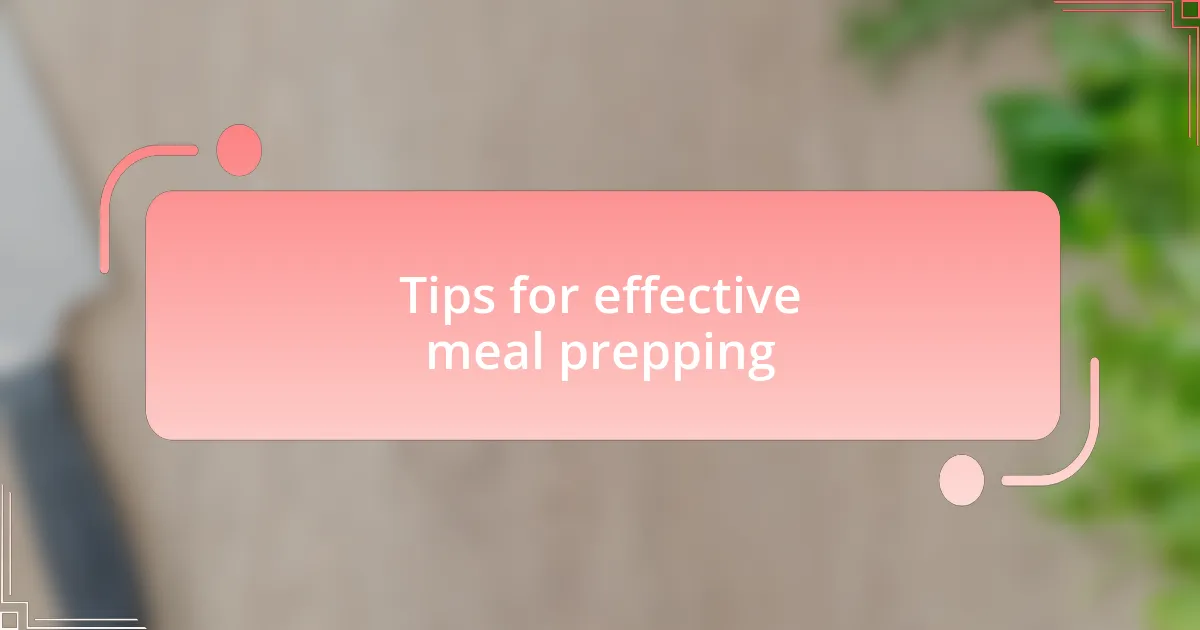
Tips for effective meal prepping
When it comes to effective meal prepping, I’ve learned the value of creating a flexible menu. Initially, I would rigidly stick to my plan, but I’ve found that allowing some wiggle room can make the process more enjoyable. If I’m not in the mood for a dish I planned, being open to swapping it out for something else helps me maintain consistency without feeling trapped. Have you ever forced yourself to eat something just because it was on your list? It’s way more satisfying to enjoy what you’re eating!
Another key tip is to batch cook staple ingredients. I often roast a big tray of vegetables or cook a large pot of quinoa at the beginning of the week, which I can use in different meals. Last week, I roasted sweet potatoes, and those little flavor-packed cubes transformed into a breakfast hash, a lunch salad, and even topped my dinner bowl. Have you ever realized that the same base can offer endless meals? This not only saves me time but also keeps my meals varied and exciting.
Finally, I find that incorporating variety into my meals keeps me motivated. I often dedicate one meal prep day to experimenting with international flavors like Thai or Mediterranean, which adds a delightful twist to my week. Just last month, I tried my hand at a spicy chickpea stew that turned into an instant favorite. Why stick to the same old recipes when culinary exploration can be so fun? Embracing this creativity truly elevates my meal prep game and helps me stay committed to eating healthy.

Sample meal prep ideas
One of my go-to meal prep ideas involves mason jar salads. I simply layer my favorite ingredients, starting with the dressing on the bottom, followed by hearty veggies, protein like grilled chicken or chickpeas, and finishing with greens on top. It’s such a joy to shake that jar up right before lunch; it’s like a mini celebration of flavor! Have you ever experienced that excitement when you know you’ve got something delicious waiting for you?
Another thing I love is preparing freezer-friendly meals. For instance, I often make a big batch of chili and portion it into containers. Freezing them means I have a quick, healthy meal ready whenever I need it, and it also brings back memories of chilly weekends when a warm bowl of chili feels like a hug in a bowl. How nice is it to open the freezer and have a comforting meal waiting for you after a long day?
I also experiment with one-pan dishes, which I find to be a game changer. A recent favorite was a sheet pan featuring salmon, asparagus, and cherry tomatoes. The best part? Everything cooked together beautifully, and the cleanup was a breeze. I remember taking that first bite and feeling totally satisfied—it’s incredible how effortless meal prep can be while still providing such delightful flavors. Have you ever tried one-pan meals? They simplify the cooking process without sacrificing the joy of a well-cooked dish.